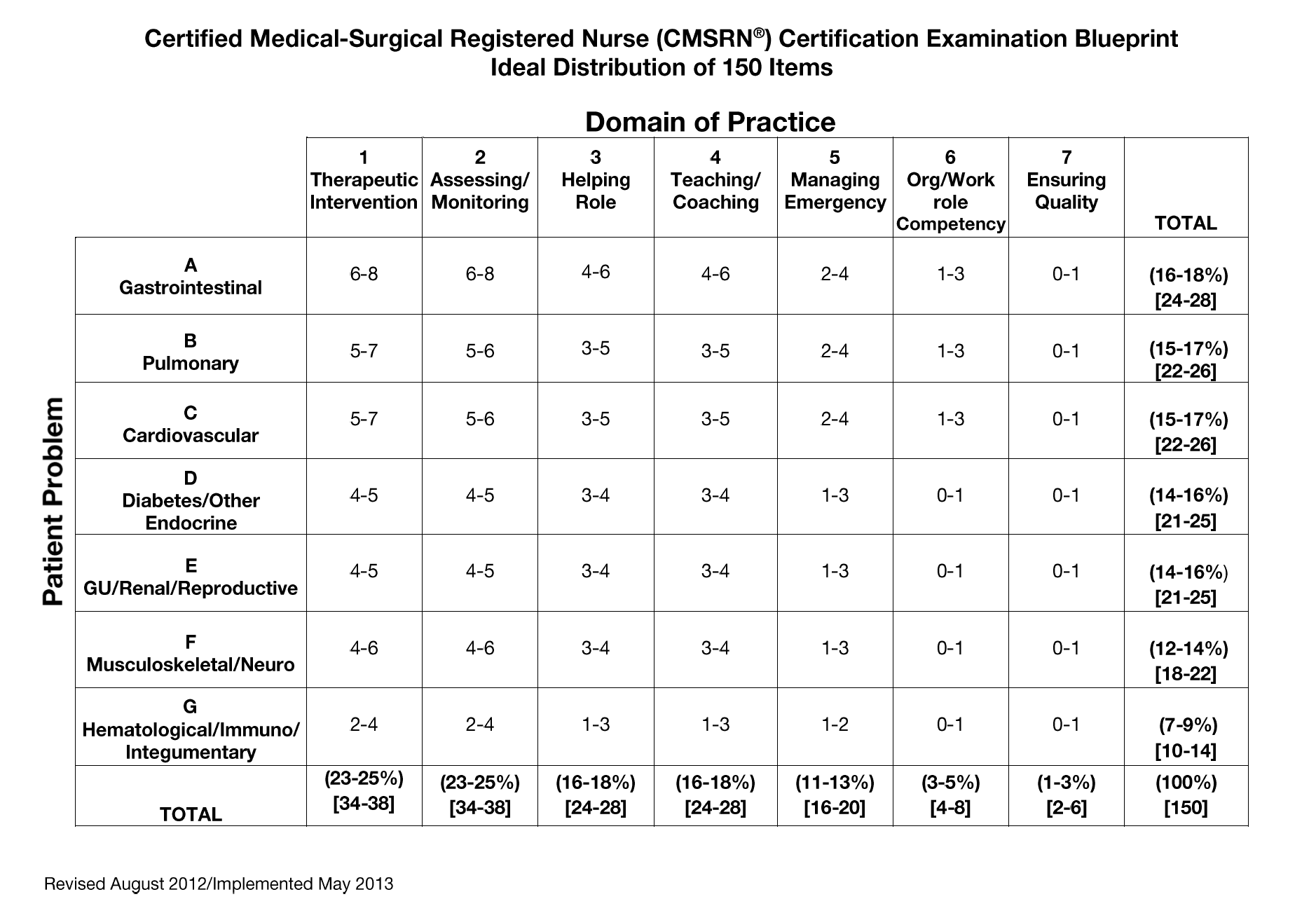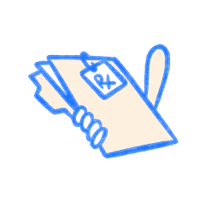The Certified Medical-Surgical Registered Nurse (CMSRN®) exam is administered by the Medical-Surgical Nursing Certification Board (MSNCB). Passing the exam certifies that a nurse holds advanced knowledge and experience in medical surgical procedures. To take the exam, one must already be a registered nurse in the United States (or a U.S. territory) working under a full, unrestricted license and have at least two years of experience as an RN in a medical-surgical setting and at least 2,000 hours of practice within the past three years in a medical-surgical setting.
The CMSRN exam has a unique structure. In short, each question probes test takers’ knowledge in relation to two fields:
1. Patient Problems by Physiological Systems
2. Domains of Nursing Practice
For example, on the exam, a question may ask about how to diagnose and monitor a patient with a pulmonary condition; if it did, the question would intersect with the pulmonary category under patient problems by physiological systems and the diagnostic and patient monitoring function category under domains of nursing practice. The following blueprint outlines the content areas that appear under each of the CMSRN exam’s two major fields of knowledge:

The CMSRN exam can be taken in two formats. Two times a year, you have the option of taking the paper and pencil exam at fifty testing sites nationwide. Throughout the year, the test can also be taken by computer at over 260 testing sites nationwide. If you choose to take the exam on paper, you’ll have 4 hours to complete 175 questions; notably, only 150 are scored questions and other 25 are pretest questions, which may appear on future exams. If you choose to take the exam on a computer, you’ll only encounter 150 questions (there are no pretest questions on the computer version of the exam), and you’ll have 3 hours to complete the exam. For both formats, the score to pass is 95 or approximately 71%.
To pass the CMSRN exam, you will need to possess a combination of experience and knowledge. Most notably, you’ll need to be able to understand different domains of nursing practice from diagnostics and monitoring to teaching and coaching are applied in relation to different medical-surgical situations (e.g., musculoskeletal and neurological or cardiovascular). In other words, as much as the CMSRN exam is designed to test your knowledge of different medical-surgical procedures, it is also designed to test your ability to apply this knowledge in specific contexts and under specific conditions. In what follows, we break down the exam’s two major fields of knowledge in detail and provide tips on how best to prepare for the exam.
Field 1: Patient Problems by Physiological Systems
Content Area 1: Gastrointestinal
24 to 28 questions on the CMSRN exam will focus on the gastrointestinal system. To prepare, you should have a thorough knowledge of the gastrointestinal system, conditions that affect this system, and common medical and surgical procedures used to respond to these conditions.
Content Area 2: Pulmonary
Anywhere from 22 to 26 questions on the CMSRN exam will focus on the pulmonary system. To prepare, you should have a thorough knowledge of the system and its parts, conditions that affect the system, and medical and surgical procedures used to respond to pulmonary conditions.
Content Area 3: Cardiovascular
There will be 22 to 26 questions that focus on the cardiovascular system. To prepare, you’ll need to understand the system and its parts (e.g., heart, veins and arteries and how they are connected). Knowledge of common cardiovascular diseases (e.g., heart disease) and their medical and surgical interventions is also essential.
Content Area 4: Diabetes (types 1 & 2) and other Endocrine
Content Area 4 consists of 21 to 25 questions focusing on type 1 and type 2 diabetes and other endocrine conditions (e.g., thyroid disease). For this part of the exam, you’ll need to possess a comprehensive knowledge of diabetes and endocrine conditions.
Content Area 5: Genitourinary, Renal, and Reproductive
Content Area 5 consists of 21 to 25 questions concerned with genitourinary, renal, and reproductive conditions and disorders. For this part of the exam, you’ll need to have a thorough knowledge of these conditions and disorders and related medical and surgical interventions.
Content Area 6: Musculoskeletal and Neurological
Consisting of 18 to 22 questions, the sixth content area focuses on both musculoskeletal and neurological patient problems. A thorough knowledge of both the musculoskeletal system and brain is required to ace this section of the exam. In addition, you will require knowledge of common musculoskeletal and neurological problems and their medical interventions.
Content Area 7: Hematological, Immunological, and Integumentary
The final content area in Field 1 focuses on hematological, immunological, and integumentary patient problems. Under this field, you’ll encounter 10 to 14 questions on topics ranging from Hepatitis C to AIDS to psoriasis.
Field 2: Domains of Nursing Practice
Field 2 is also comprised of seven content areas. Each area focuses on a major domain of nursing practice. Once again, on the CMSRN exam, you’ll be expected to respond to questions that probe your ability apply these practice areas in relation to specific physiological systems.
Content Area 1: Administering and Monitoring Therapeutic Interventions
This section consists of 34 to 38 questions and is a major focus of the exam. Specific questions include but are not limited to:
• How to administer medications accurately and safely.
• How to monitor patient for therapeutic responses, reactions, untoward effects, toxicity, and incompatibilities of administered medications.
• How to maintain patent airway.
• How to monitor for signs and symptoms of complications of disease processes.
• How to use adaptive/assistive devices for mobility, immobility, positioning, and comfort.
Content Area 2: Diagnostic and Patient Monitoring Function
Consisting of 34 to 38 questions, diagnostic and patient monitoring is a major focus of the CMSRN exam. The questions under this content area focus on assessment, data collection and how to develop a strategic plan of care. Specific knowledge fields include but are not limited to:
• How to conduct and document a comprehensive baseline assessment.
• How to identify risk factors for illness and complications of illness.
• How to analyze all patient data in formulating a plan of care.
• How to develop an individualized plan of care.
• How to identify, document, and report deviations from expected findings.
Content Area 3: Helping Role
24 to 28 questions will focus on questions concerned with helping patients. These questions may include but are not limited to questions focused on the following topics:
• How to assess patient’s level of comfort/pain.
• How to modify plan of care to achieve patient’s optimal level of comfort (i.e., pharmacologic and non-pharmacologic interventions).
• How to act as an advocate to help patient meet needs/goals.
• How to provide culturally competent patient care.
• How to identify, acknowledge, support, and facilitate patient/family decisions regarding end-of-life care.
Content Area 4: Teaching/Coaching
Another 24 to 28 questions focus on teaching and coaching functions. Among other topics, specific questions will probe test takers knowledge of the following practices:
• How to assess the patient’s and family’s readiness and ability to learn.
• How to identify barriers to learning.
• How to teach patient and family about available community resources.
Content Area 5: Effective Management of Rapidly Changing Situations
16 to 20 questions on the CMSRN exam focus on effective management of rapidly changing situations or emergency situations. Be prepared to respond to questions on the following critical nursing practices:
• How to determine priorities in rapidly changing situations.
• How to rapidly match demands and resources in emergency situations.
• How to initiate basic life support.
• How to use existing guidelines, protocols and policies to respond to urgent and emergent situations (e.g., chest pain or stroke).
Content Area 6: Organizational and Work-Role Competencies
The sixth content area under domains of nursing practice focuses on organizational work-role competencies (e.g., how to evaluate one’s practice based on established standards of care; how to set priorities based on assignment, unit, and institutional needs; and how to delegate patient care assignments based on competency levels and the scope of practice of healthcare team members). Under this content area, be prepared to respond to 4 to 8 questions.
Content Area 7: Monitoring and Ensuring Quality Health Care Practices
Consisting of only 2 to 6 questions, this section is the least heavily weighed part of the CMSRN exam. On this part of the exam, questions focus on the following topics:
• How to collect and report data regarding system failures (e.g., chain of command, equipment, safety, medication administration, and computer systems).
• How to incorporate evidence-based practice into the patient’s plan of care.
• How to question/clarify orders as appropriate.
• How to communicate effectively to the healthcare team.

